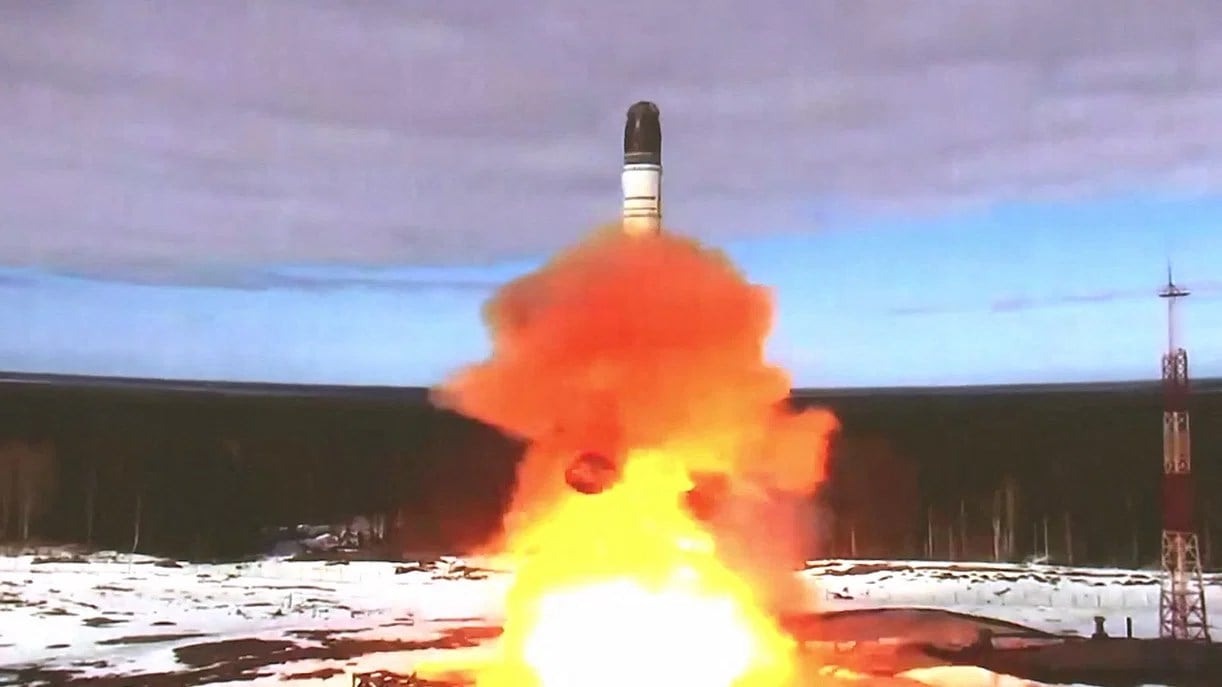Russia test fires 'advanced' ICBM
The primary aim of the drill was to test the "advanced combat equipment of intercontinental ballistic missiles."
-

This grab made from a handout video footage released by the Russian Defense Ministry on 20 April, 2022 shows the launching of the Sarmat intercontinental ballistic missile at Plesetsk testing field, Russia. (AFP)
Russia has successfully test-fired an "advanced" intercontinental ballistic missile (ICBM), as per the Russian Ministry of Defense.
The ministry said in a statement that a "combat crew successfully launched an intercontinental ballistic missile (ICBM) of a mobile ground-based missile system" from its Kapustin Yar test site on Tuesday.
"The missile's training warhead hit a mock target at the Sary-Shagan training ground (Republic of Kazakhstan) with given precision," it added.
Although the type of missile used in the launch on Tuesday was not specified by the Russian Defense Ministry, the latter stated that the exercise's goal "was to test advanced combat equipment of intercontinental ballistic missiles."
"This launch made it possible to confirm the correctness of the circuit design and technical solutions used in the development of new strategic missile systems," it added.
Russian President Vladimir Putin announced the deployment of a new type of ICBM in February in response to US accusations that the missile had failed a recent test.
The Sarmat is one of Russia's next-generation missiles that Putin has referred to as "invincible," and can carry several nuclear warheads.
At the end of March, Moscow announced that it began military exercises including thousands of troops, during which Russian forces launched the nuclear-capable Yars intercontinental ballistic missile system, a replacement for Russia's Topol system.
The Yars ICBM, dubbed by Putin as part of the country's "invincible weapons" due to the lack of publicly recorded anti-air missiles that can intercept it, has a reported range of 12,000 km and travels at a speed over 20 times the speed of sound - over Mach 20 or 24,500 km/h.
The advanced missile system can also be launched from silos or loaded on a truck for mobility.
Russia boasts hypersonic ICBM inventory
In December 2022, Russia announced that a regiment armed with Avangard missiles conducted combat duty at the Yasnenskoye missile formation in the Orenburg Region of the southern Urals.
The Avangard hypersonic glide vehicle can fly through the dense layers of the atmosphere at up to Mach 27 (about 32,000 kilometers per hour), performing direction and altitude maneuvers, and overcoming any missile defenses.
The missile system with the hypersonic glide vehicle will improve the Russian Strategic Missile Force's combat capabilities, according to the Russian Defense Ministry.
Russian President Vladimir Putin publicly unveiled the system in 2018, and it has since been projected as the cornerstone of the country's hypersonic capabilities.
Read more: Russia's Roscosmos to build 46 ICBMs

 3 Min Read
3 Min Read








